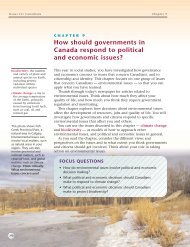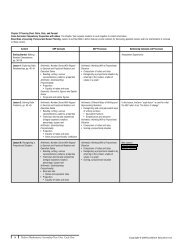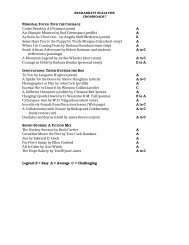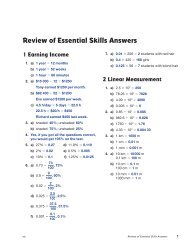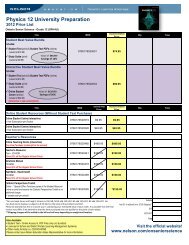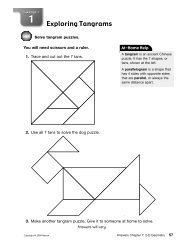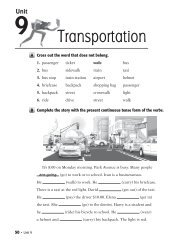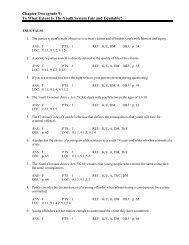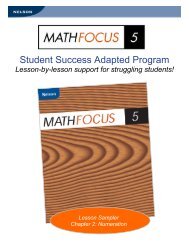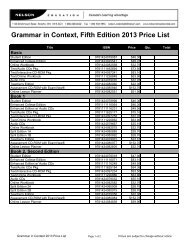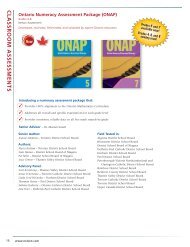PRE-PUBLICA TION EDITION - Nelson Education
PRE-PUBLICA TION EDITION - Nelson Education
PRE-PUBLICA TION EDITION - Nelson Education
Create successful ePaper yourself
Turn your PDF publications into a flip-book with our unique Google optimized e-Paper software.
4Research SkillsIn modern society, you are constantly bombardedwith information. Some of this information isreliable, and some is not. Trying to find the “right”information to conduct scientific research may seemoverwhelming. However, the task is less dauntingwhen you learn how to search efficiently for theinformation you need. Then you must know how toassess its credibility. Here are some tips that will helpyou in your research.4.A. General Research Skills4.A.1. Identify the InformationYou Need• Identify your research topic.• Identify the purpose of your research.• Identify what you already know about the topic.• Identify what you do not yet know.• Develop a list of key questions that you need toanswer.• Identify categories based on your key questions.• Use these categories to identify key search words.4.A.2. Identify Sources of InformationIdentify places where you could look for informationabout your topic. These places might includeprograms on television, people in your community,print sources (Figure 1), and electronic sources(such as CD-ROMs and Internet sites).Figure 1 Your school library and local public library are both excellentsources of information.Refer to “Using the Internet” on page 619.Remember, gathering information from a variety ofsources will improve the quality of your research.4.A.3. Evaluate the Sourcesof InformationRead through your sources of information and decidewhether they are useful and reliable. Here are fivethings to consider:• Authority: Who wrote or developed theinformation or who sponsors the website? Whatare the qualifications of this person or group?• Accuracy: Are there any obvious errors orinconsistencies in the information? Does theinformation agree with that of other reliablesources?• Currency: Is the information up to date? Hasrecent scientific information been included?• Suitability: Does the information make sense tosomeone with your experience or of your age?Do you understand it? Is the information wellorganized?• Bias: Are facts reported fairly? Are there reasonswhy your sources might express some bias? Arefacts deliberately left out?4.A.4. Record and Organizethe InformationAfter you have gathered and evaluated your sources ofinformation, you can start organizing your research.Identify categories or headings for note taking. In yournotebook, use point-form notes to record informationin your own words under each heading. You must becareful not to copy information directly from yoursources. If you quote a source, use quotation marks.Record the title, author, publisher, page number, anddate for each of your sources. For websites, recordthe URL (website address). All of these details arenecessary to help you keep track of your sourcesof information so that you can go back to them toclarify any points in the future. You will also need thisinformation to create a bibliography. If necessary, addto your list of questions as you find new information.618 Skills Handbook NEL



